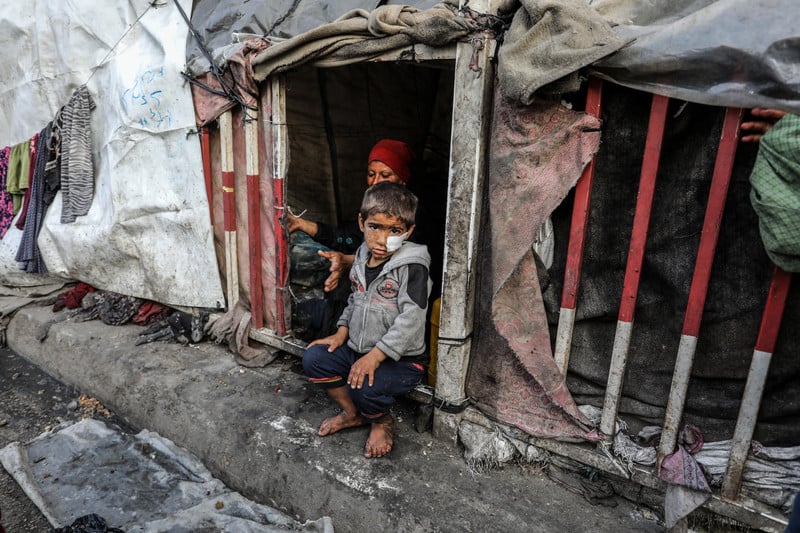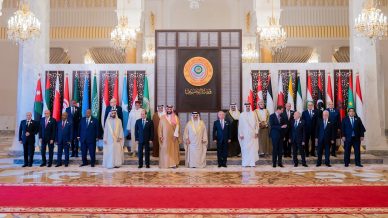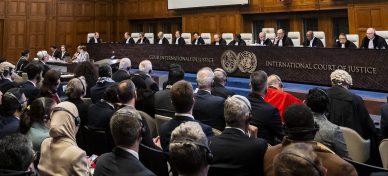By Bashaer Muammar
On 7 October, five days before I was scheduled to marry Amir, I should have been sending out wedding invitations and moving my pink bags into his home – a cherished tradition in my community.
Last week, I discovered the pink bags in my family’s damaged home in Khan Younis, southern Gaza.
They are now smeared with dust after being abandoned for over six months. There is no home left to place them in.
Just like the rubble that surrounds us, our souls now feel shattered and lost. Our faces are pale with despair as we struggle to find a way to live or move forward.
From the very outset of Israel’s genocide, Gaza has been consumed by a sense of uncertainty. Amid this chaos, I find myself lost, struggling to navigate even the smallest details of my life.
Decision-making becomes impossible. Every choice seems wrong, every path filled with danger.
Our sole focus is on survival – from evacuating our home, to fleeing our city, to seeking refuge in an overcrowded center in Rafah, and ultimately returning to a tent next to my damaged and now unlivable home in Khan Younis.
The journey has been long and exhausting for both Amir and me, a series of painful separations and reunions. Yet Amir’s experience has been even more harrowing.
His journey began in Gaza City’s Beach refugee camp, moving from schools there to al-Shifa hospital, then to Khan Younis and finally to Rafah, where we hope the suffering might end.
For the first 36 days of the war, I was unable to meet Amir. Any communication was severed by the internet and communication outages caused by relentless airstrikes.
Eventually, Amir sought refuge in my city, and we were able to reunite during the brief seven-day truce in November.
But when Israeli forces invaded Khan Younis, we were forced to evacuate once again, this time to Rafah, each of us separated from the other, staying with our respective families.
Later, I returned to Khan Younis. Amir stayed in Rafah.
Now, Israel threatens to invade Rafah, putting at risk 1.5 million displaced people.
Tormented by mosquitoes
It’s not just our happiness and wedding that Israel has deprived us of: Israel has stolen our present and our future.
Our dreams have been shattered by the relentless tide of war.
Nearly seven months on, we remain in the dark about the fate of our apartment on al-Thalani street in Gaza City. Our humble second-floor apartment was a sanctuary we had lovingly decorated with shades of brown and beige, colors that resonated deeply with us.
Every detail, from the bedroom set, sofa and carpets, to the curtains and dining table, was chosen with care, even down to the spoons and forks in our kitchen.
In November, I saw a haunting black and white video from our street: Israel had bombed a building perilously close to ours, causing rubble to rain down and damage our apartment from the eastern side. To this day, we remain unsure if our cherished belongings have survived the devastation.
I used to daydream about my future with Amir, imagining the happiness we would share.
As a young working woman, I once feared I might not succeed in my roles as a wife or mother. My career was a source of pride and a priority for me.
But now, this war has forced me to reconsider everything. What does it mean to be a wife in a time of war?
What does it mean to bring children into a world where the lives of 15,780 innocent kids were taken in just 200 days?
I now live with my parents and brother in a small tent in Khan Younis. The days are scorching hot, the nights biting cold.
The mornings and evenings offer a brief respite with its spring-like weather.
In the heat, our tent is constantly invaded by flies and insects, causing harm to our skin and making life unbearable. I spend entire nights awake, tormented by mosquitoes.
Also at night, the menacing barks of wild dogs often echo around our tent. My mother assures me they mean no harm, an attempt to ease my fears.
Yet my subconscious remains unconvinced, keeping me in a state of constant terror.
No good choices
The psychological toll of hearing Israeli drones and other warplanes overhead, combined with the relentless buzzing of flies, makes me want to scream and shout, begging for it all to stop with every ounce of my being.
Both my mother and Amir’s mother have advised us to build a small tent to be able to live together. We are utterly lost, grappling with the question of how and where we can possibly live under these circumstances.
More couples in Gaza are choosing to get married inside tents. Social media influencers and activists celebrate this as an act of resilience, and I can see why.
I love witnessing love triumph over war.
Yet I remain lost and uncertain. I’ve always considered myself a strong woman, but now I question what strength truly means.
Is fleeing Gaza a sign of strength, or is staying put the brave choice?
Is getting married during wartime the right decision?
Is enduring until the end of the war commendable?
Someone once captioned a photo of a Gaza couple celebrating their marriage during the war with the words, “at least we fear together.”
Yet, just days later, Israel killed a different couple shortly after they had wed.
I can’t help but wonder what our fate will be – whether we’ll be afraid together, displaced together or even killed together. The haunting reality lingers that one of us might leave this world while the other remains.
-Bashaer Muammar is a Palestinian activist and translator from Gaza. Her article appeared in the Electronic Intifada.













